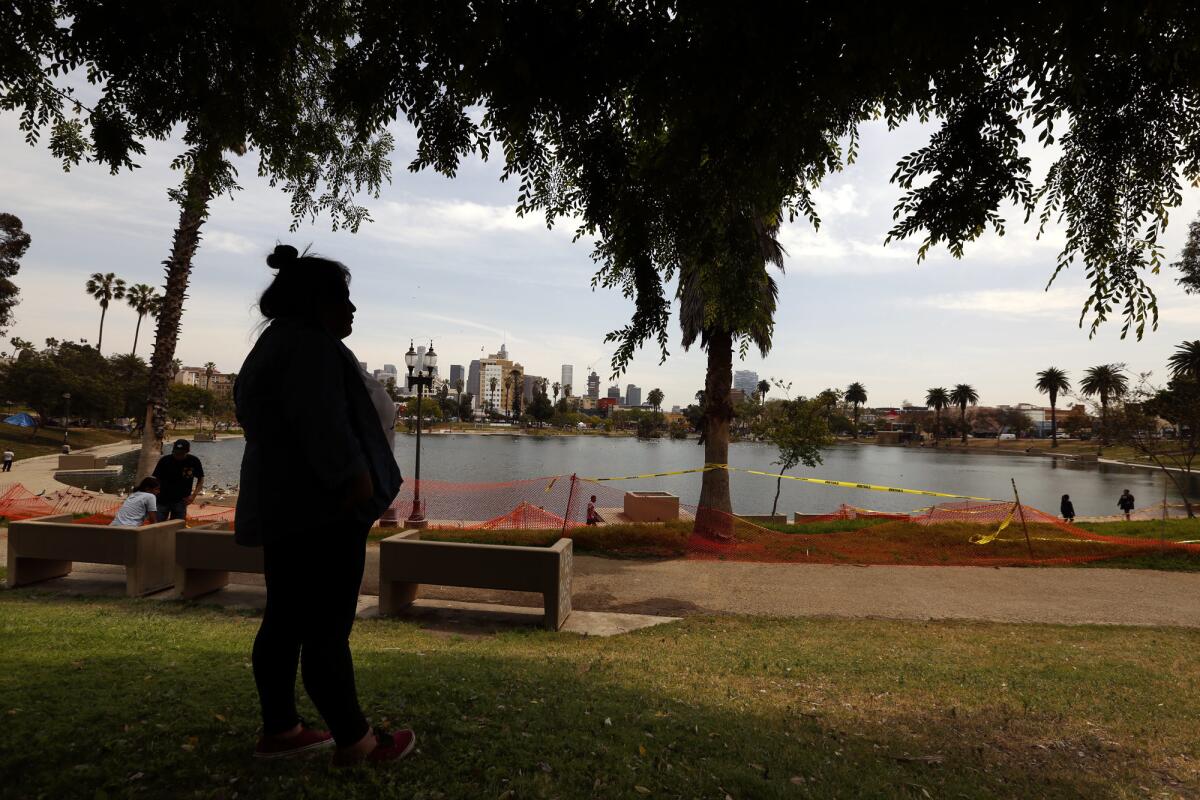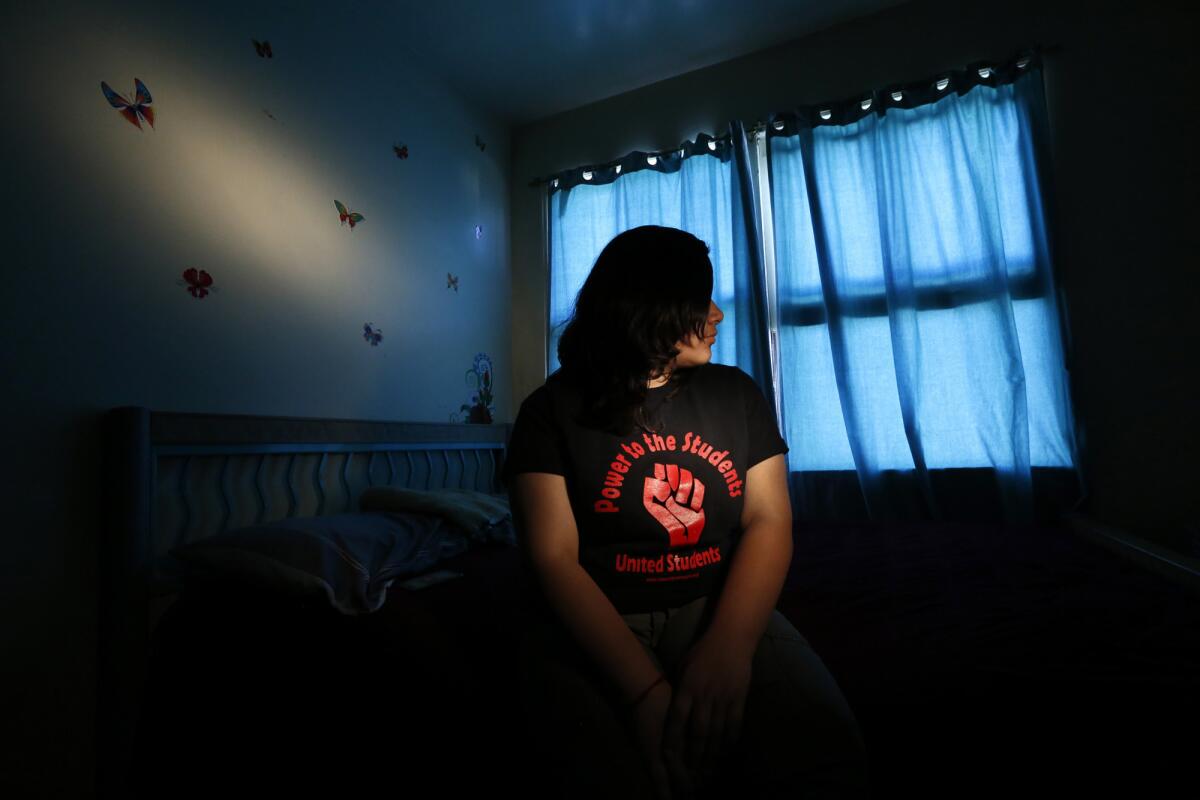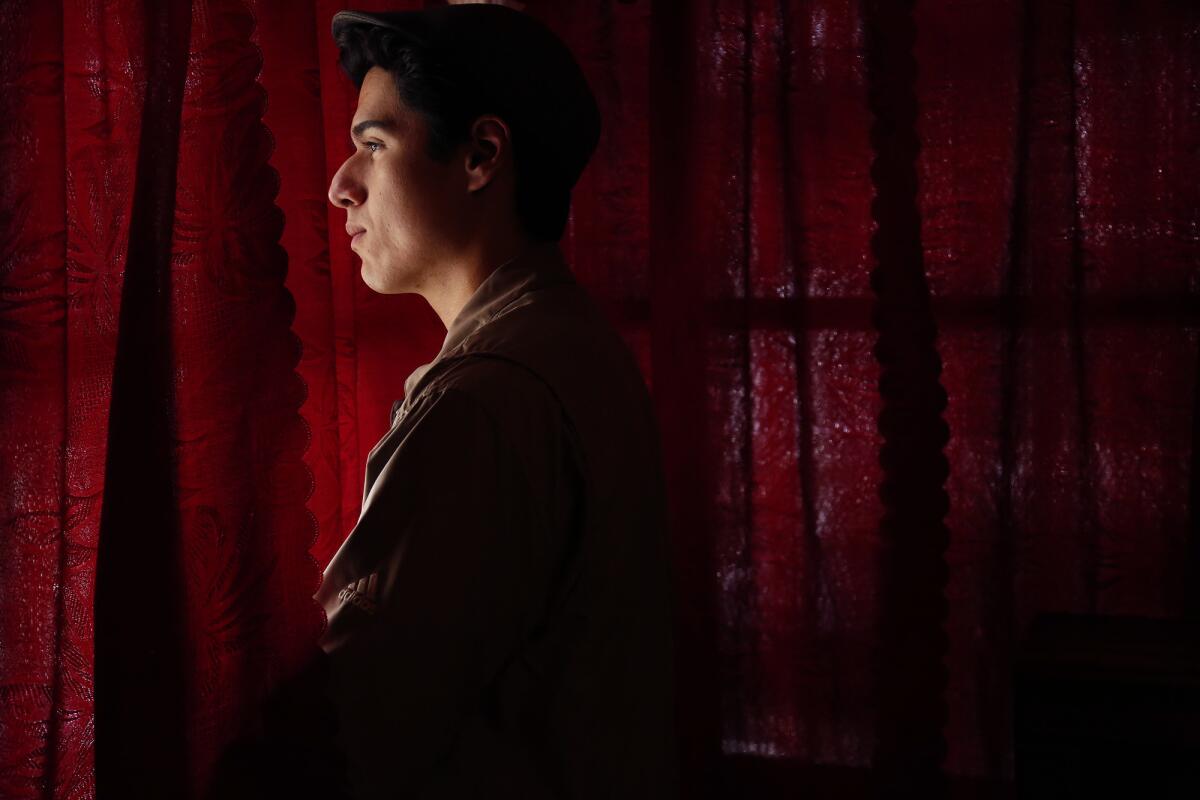What it’s like to be a teen in L.A. with a parent in the U.S. illegally

- Share via
It was hard not to eavesdrop in the tiny Pico-Union studio where Maria Garcia grew up.
She was around 9 when her father came home one day from his low-wage job as a garment worker and told her mother about the immigration raid at his downtown L.A. factory. She could hear their relief that her father hadn’t been found.
She began to comprehend then that her parents were in constant danger. But it took her a few more years to understand why.
When Garcia was in sixth grade, she went home and asked her mother what her classmates meant when they talked about la migra taking away parents without papers. Couldn’t they just go buy some paper from the store?
“I remember her … pulling out my birth certificate and being like, ‘This is what a paper is,’” said Garcia, now 18. It allows you to go to a doctor, her mother told her, and walk around without being afraid of being pulled away from your family.
“For her … ICE wasn’t just a thing, it was like a feeling,” Garcia said of Immigration and Customs Enforcement. “It was a feeling of having so much impotence.”
Garcia, who is now a high school senior, is one of many thousands of teenagers who were born in the U.S. to parents who are in the country illegally. A 2013 USC analysis found that about 16% of children in Los Angeles County were U.S. citizens with at least one parent without legal status. In 1999, Garcia was one of about 215,000 children born in the U.S. to immigrants in the country illegally, according to the Pew Research Center.
These children now are feeling more anxiety than ever about the fate of their parents. And many teenagers are trying to take on the adult responsibilities of protecting their loved ones and friends from deportation.
During the presidential campaign, when Donald Trump appeared on TV calling Mexican immigrants rapists and criminals, Garcia’s parents laughed, sure that he was going to lose. They would joke then about being taken away, and about how she’d have to take care of her younger siblings. It was never serious— until he won and news began to break about immigration raids in L.A.
When Trump took office, Garcia was two months from her 18th birthday. She began counting down the days. If she had to, she wanted to be an adult to take custody of her 15-year-old brother and 11-year-old sister.
She’s never traveled beyond Santa Barbara, and she thought about college in San Francisco. But now that’s not in the cards.
“I just feel like I should just stay in L.A.,” Garcia said. “How would I get back fast enough to be able to get my brother and my sister? And where would I take them?”
Like many teens in her situation, Garcia deals with the helplessness of not having the power to protect her own parents by advocating for the young people around her. At school, she started what she calls a sanctuary organization, where anyone can feel safe to share a story, ask questions about college applications and financial aid, or talk about something more personal.
“If you’re living in fear … we’re here for you and we hear you, because we are also living in fear,” Garcia told her classmates at a Thanksgiving potluck a couple of weeks after Trump’s election. “Turn that fear into something productive and something to show others that we’re not going to be taken down easily.”
To be like butterflies

Lupe decorates the wall above her bed with butterfly stickers.
“Because they’re free,” the high school sophomore said, sitting in a Boyle Heights coffee shop after school.
Lupe and her family don’t have the freedom to move around easily. Her mother and father met decades ago in an ice cream store in Zacatecas, Mexico. Lupe’s father is a naturalized U.S. citizen. Her mother entered the country illegally about 20 years ago to join him and to seek better healthcare for the benign tumor that remains in her brain. Lupe’s mother is close to citizenship now, she says — it took this long because the family didn’t have money to pay application and legal fees.
She asked that her last name not be used because she fears her mother could be deported.
Lupe has taken on some of the burden of protecting her mom, who tries to avoid TV these days, she said, because it’s too scary.
It was Lupe who told her recently about ICE raids nearby and to beware of immigration enforcement agents dressed in police vests.
Lupe is preparing for the worst. When her school held a “Know Your Rights” workshop for students, she brought home an information packet for her mom.
Community organizations rely on teens like Lupe to get important news to the adults around them, said Maria Brenes, executive director of the East L.A. advocacy group InnerCity Struggle.
“I see a tremendous amount of stepping up on the part of young people to connect this information to the people who need it the most,” Brenes said.
Lupe cried as she talked about the possibility that her mom might be detained. But “I don’t want to make her feel guilty,” she said, so she tries not to cry in front of her.
She feels her own guilt about enjoying freedoms that her mother does not.
She recently flew to her parents’ hometown, which her mother can’t do, for a cousin’s quinceañera. Her mother sometimes has to wait months for a doctor’s appointment and has only emergency medical coverage.
I just want my mom to have the freedom that any U.S. citizen has of coming and going.
— Lupe, 15
Lupe and her parents don’t talk much about what would happen if her mother were deported. But she worries about it often. Her father isn’t well and couldn’t care for her on his own, so they’d either have to move in with her older brother nearby, or go to an uncle in Texas or Chicago. What if she didn’t fit in with her brother’s family? What if her class credits wouldn’t transfer to another state?
Mostly, she can’t imagine a life without her mother. She would miss her queso enchiladas, the comfort of waking up and knowing she was in the next room, the security of counting on her to be at every parent-teacher conference or Advanced Placement fair.
Such thoughts overwhelm. So Lupe busies herself with school clubs and activism — plastering her room with posters she’s collected from recent marches. Behind her closed door, she tries to keep her mind on the hours of homework she has to do every night. And she tries not to let her parents see her stress.
Sitting in their Boyle Heights kitchen knitting a pink baby blanket, Lupe’s mom, who asked not to be named for her safety, said she didn’t think her status affected Lupe’s daily life, beyond limiting family trips to see relatives.
Lupe sat beside her, eating a cracker, and said nothing. As her mother took out her phone and swiped through photos of their family in Mexico — of Lupe’s grandmother in the hospital surrounded by her aunts and uncles, who share Lupe’s birthmark single streak of silver running through their black hair — the teenager looked the other way and tears slid down her cheeks.
“I just want my mom to have the freedom that any U.S. citizen has of coming and going,” she said. “I just want her to feel safe to go visit her family when they’re sick, or when there’s a party, or a reunion … like any human would like to do.”
‘So many people had questions, I couldn’t answer them all’

Daniel Garcia, 17, walks around with a “Know Your Rights” pamphlet folded up small in his wallet, and a stack of immigration rights handouts — which he wrote — in his backpack.
The Woodrow Wilson High School junior is known around campus for his political involvement. He has served on the mayor’s youth council and is active in organizations that advocate for social justice issues.
But he wasn’t prepared for the need that surfaced in November or how much he would feel the weight of it.
Suddenly students at school who had been brought into the country illegally began to approach him. They wanted to know if their protected status under the Deferred Action for Childhood Arrivals program was at risk, if their medical coverage would change, what legal services were available. Some who came to him were friends. Some were strangers.
“So many people had questions, I couldn’t answer them all,” Daniel said. “After the third guy, I just made printouts.” He started handing them out.
He knows he’s luckier than many students. He was born in the U.S., and his parents are citizens. But his mother was brought into the country illegally when she was 5, and he feels that connection with — and responsibility to help — others.
Students who have to come to him have been especially worried about reported DACA arrests.
“I don’t want to tell them something and then they act on it and then it goes bad because of me,” Daniel said. “So for me it’s a lot of pressure. I don’t really like it.”
When a close friend asked if it was safe to apply for college financial aid, Daniel told her the federal government wasn’t supposed to use such information to detain people.
“She asked me, ‘Can you promise me they won’t?’ And I couldn’t promise her that,” he said. So he sat with her and tried to be supportive as she decided to go to community college instead of a four-year university. The next semester, he watched her drop her AP classes.
Daniel feels he’s more privileged than his friends in part because he’s very well informed about his and their rights.
So when he and his friends get stopped on the street walking home in El Sereno, he does the talking. It’s an unspoken rule that those in the group who don’t have legal papers will quietly move to the back.
Twitter: @Sonali_Kohli
Sign up for Essential California
The most important California stories and recommendations in your inbox every morning.
You may occasionally receive promotional content from the Los Angeles Times.








